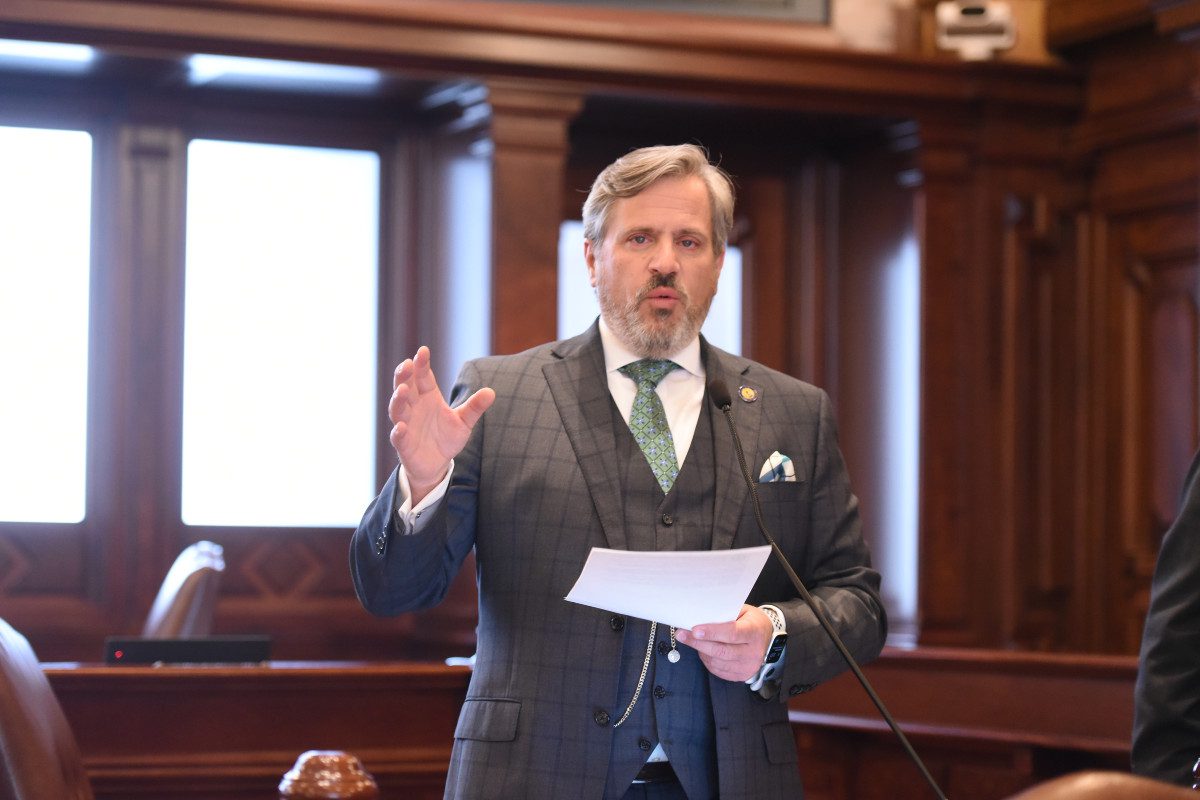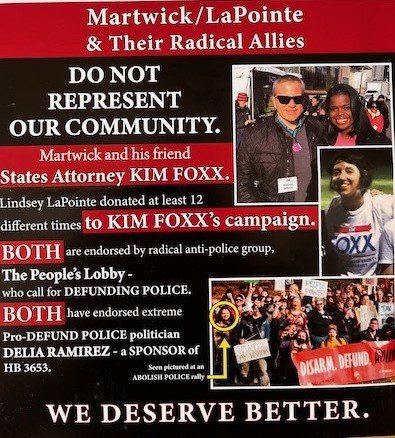Chicago Police Union Fails to Oust the Lawmakers It Targeted
The Fraternal Order of Police hoped to oust several Democrats in last week’s primaries as retaliation for a reform bill adopted in 2021.
Grace Del Vecchio | July 6, 2022


Chicago’s largest police union gambled big in the June 28 elections in Illinois. Intent on sending a message that voters would punish criminal justice reform, the Fraternal Order of Police Lodge 7 made it a priority to defeat a slate of incumbent lawmakers in the Democratic primary.
As results rolled in, though, there was little suspense. The four lawmakers targeted by the FOP, Senators Robert Martwick and Omar Aquino and Representatives Sonya Harper and Lindsey LaPointe, all easily defeated their FOP-endorsed challengers. They received between 66 and 75 percent of the vote in their respective primaries.
Martwick, Aquino, and LaPointe represent Chicago’s Northwest Side, home to a diverse mix of immigrants and working and middle-class residents—and a heavier than average share of residents who are police officers. Harper’s district extends into the city’s Southwest Side.
Also on Chicago’s Northwest Side, Anthony Quezada, a democratic socialist who has worked on enhancing police accountability, defeated Luis Arroyo Jr., an incumbent on the powerful board of Cook County, the county that contains Chicago. The FOP-backed candidate in that race came in third. All FOP-endorsed candidates for county board, sheriff, and assessor also lost; the only FOP-endorsed legislative candidate who won is Michael Kelly, an incumbent member of the state House.
The FOP’s effort to defeat lawmakers in Illinois was fueled by the union’s anger over the SAFE-T Act, which Illinois adopted in 2021. The law, which was championed by the Black Caucus, limits pretrial detention to people accused of specific felonies and it will end the money bail system by 2023. The law also contained provisions meant to enhance police accountability, including easing anonymous complaints and the decertification process, and requiring officers to intervene if their counterparts are using unauthorized or excessive force.
“You literally just handed the keys to the criminals,” John Cataranza, the president of the FOP, said at the time. Cataranza has been a staunch opponent of the Black Lives Matter movement since taking the FOP’s leadership position in May 2020.
But the provisions dealing with policing in the SAFE-T Act were weakened during the legislative process, in part during negotiations with law enforcement groups. A measure that would have curtailed qualified immunity, the doctrine that largely shields police officers from civil liability over misconduct and that Cataranza strongly supports, was cast aside.
Martwick, the senator who was the FOP’s chief target last week, supported these compromises with the police, including keeping protections for police officers like qualified immunity. He also supported a separate piece of legislation to boost pensions for firefighters and to help police recruit and retain officers.
These positions earned him some support from law enforcement. But Cataranza and the FOP 7 maintained a hard line against him. Police unions nationwide have been among the strongest foes of any criminal justice or policing reform, including fighting measures that enjoy wide support like civilian oversight boards.
The Chicago police union recruited Erin Jones, an 18-year veteran of the Chicago police department, to challenge Martwick, sparking a staunchly negative campaign. It went so far as trying to strongarm three members of Chicago’s city council into opposing Martwick, lest they face retribution in their own races.
“Our members want Martwick’s head on a platter,” Cataranza said in a meeting, according to the Chicago Sun-Times. “He has to go. And you either are for our member or you are for Bob Martwick, who helped champion that bill. There is no middle ground.”
The local FOP did not respond to a requet for comment about its involvement in these primaries.
A PAC funded by the FOP sent out flyers that attacked the union’s targets and called the legislation they supported “the most radical anti-victim, Pro-criminal, and anti-police legislation in the nation.” The union also tied them to Kim Foxx, the reform-minded Cook County prosecutor who secured a second term in 2020 despite facing heavy attacks of her own.


Given Chicago’s heavily-Democratic electorate, these candidates are favored to win their general elections in November.
These primary results in Chicago came just three weeks after candidates critical of the status-quo on policing had a good election night in Los Angeles. Eunisses Hernandez, an abolitionist organizer, ousted an incumbent city council memberor, while other progressive council candidates are heading into November runoffs in the lead. In the Los Angeles controller election, Kenneth Mejia came in first and will face a runoff after running on criticizing the size of the city’s police budget. The Los Angeles police union spent heavily in many of these races.
Allie Lichterman is an advocate with People’s Lobby, a Chicago-based organization that supports progressive policies and candidates, and she has spent years working on Chicago’s Northwest Side. She said the People’s Lobby sprang into action to support candidates who were being targeted for their support of the Pretrial Fairness Act.
“[Our members] really threw down to make sure that they did not lose because they took their vote,” she told Bolts.
The organization endorsed Marwick, LaPointe and Harper. It also backed other candidates targeted by the FOP including state Rep. Delia Ramirez (D-Chicago), a progressive who won a heated congressional primary for Illinois’s Third District.
Along with the endorsements, members of People’s Lobby knocked on over 8,000 doors on the Northwest Side within three months, making the case that the 2021 reforms were positive for safety.
“We brought the Pre-Trial Fairness Act at every door, and people really understood … that locking people up and throwing away the key and taking away that presumption of innocence doesn’t actually make us more safe, and certainly destabilizes communities,” said Lichterman.
“We’d have conversations that started about public safety…people care about education and speed bumps, and healthcare and all sorts of other things that they know go into making their communities thrive. And we were really able to move people using that, and the FOP narrative just totally felt flat.”


